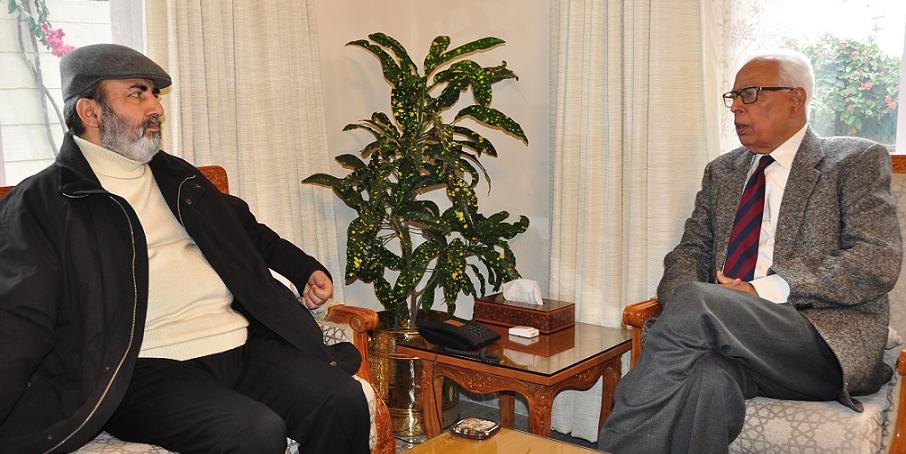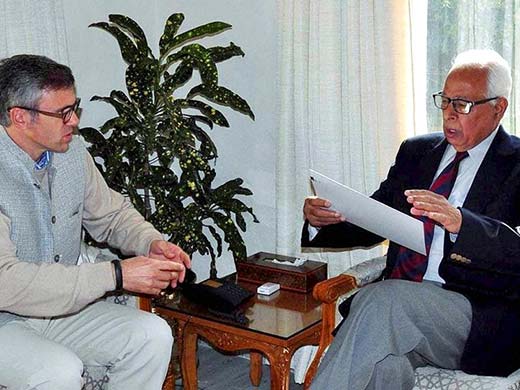Political parties have failed to cobble up a governing relationship. With governor N N Vohra finally promulgating his rule in J&K, the state expects some semblance of governance that was missing since September 7 floods, last year. Picking up the pieces from the public statements that BJP and PDP are making, R S Gull explains the issues that could still delay the process, if not wreck it completely

Against surging public dissent opposing the very idea, all indications suggest PDP and BJP are formally inching towards “structured dialogue” next week for creating the common minimum programme (CMP) for a possible government. Thrown up as two majors of a hung house, a dithering engagement is delaying the deal.
The two parties representing different cultures and ideologies, both at political and mandate levels are aware of the fact that shades of grey do not exist in their black-and-white combination. It is not vegetarian versus non-veggies or lotus worshippers and lotus-eaters only, it is finding a common ground between two forces with one keen to retain J&K’s so called exclusivity and the other to integrate it with the federation fully.
Despite emerging leaders from two regions on different planks, the two parties have their own compulsions to join hands. BJP may never touch the mark it has reached if it does not join government of the state and PDP may ill-afford ‘passing the buck’ because it has been literally out of power since 2005.
The other compulsion is situational. This contrast is considered a way-out to prevent state’s possible trifurcation, as a consequence of denial to Jammu mandate. Trifurcation, interestingly, was suggested long back by UN negotiator Sir Own Dixon in fifties and more recently by comrade Indrajit Gupta, the then Home Minister, in 1990s. These two compulsions will soon push the two parties to some common ground, insiders’ privy of the back-channel interactions say.
But the delay by the two parties in cobbling up a relationship or surrendering to the difficulties has already landed J&K under governor’s rule. Though the mandate of the last assembly was expiring on January 19, Omar Abdullah’s refusal to continue as caretaker Chief Minister forced N N Vohra to promulgate his rule. In a way, it was better because Vohra will be able to take some decisions on key and crucial issues, an option that Omar lacked as nominal head.
But the governor’s rule is unlikely to have an adverse impact on the two principal parties, already negotiating a deal. Both the parties are on the same page saying they will take some more time to finalize the deal. They have already had the first 90-minute meeting but the ice is still not broken. PDP is dithering because of the consequences it entails. But the party is aiming big for the ‘sacrifice’ the deal entails. This, however, remains to be seen if PDP will oblige Modi before Barrack Obama visit on January 26, and the Delhi elections, slightly later.
Party insiders said the issues do not matter much and some of them might have already been settled. “We are complete strangers to each other and if I take your perception that we are in the courtship then we need to know each other,” one party leader said. “It is stark contrast in cultures and chemistries apart from politics and the mandate.”
While the real talking is expected this week, the two parties have their own concerns, agenda for their own constituencies. Here are the seven major issues that are on the table, still so ticklish and contentious that these can wreck the deal.
1. Engaging Pakistan
PDPs agenda of reconciliation process made it Kashmir’s most voted party in 14 years and that has resumption of bilateral talks central to it. Soon after the results when shelling resumed on Jammu borders, Omar’s two-liner explained it on twitter: “If Mufti’s BJP alliance hinges on an early resumption of the Indo-Pak dialogue, then the sound (of shelling) you hear are his dreams crashing to the floor. Call me a cynic but I can’t shake the skepticism.”
This issue could be source of tension between the two. BJP sources said they would not succumb to this pressure because it encroaches upon foreign policy which is a central domain. This, they say, will force other states to have similar demands like Tamil Nadu on Sri Lanka.
2. Engaging Hurriyat
Initially, BJP was harsh towards the idea saying it was centre’s prerogative. Later, when Mufti Sayeed invited moderate Hurriyat leader Prof Abdul Gani Bhat for dinner, the situation eased as it sent a message. While BJP sources suggest the party is keeping some informal kind of contact with the Hurriyat, it will not have a problem if it is guided by the state government.
3. Refugees
At the time of partition, J&K’s demography witnessed various upheavals. While Jammu was systematically depopulated from Muslims, tens of thousands of families left from Kashmir too and the process continued till late sixties. Two types of immigrants entered present J&K from the other side – Hindus inhibiting parts of the princely state and many others from West Pakistan. Most of them settled in Jammu.
While 26319 Hindu families (of 1950) uprooted from various J&K territories are state subjects and enjoy every right, another 5764 families which had migrated from West Pakistan territories are non-state subjects. They have been seeking these rights for three generations now and no government is in a position to touch this issue because it can change the demographic composition of the state. Refugees had gone to Supreme Court earlier and their case was rejected. BJP is keen to make it part of the CMP but PDP apparently cannot afford it.
In reaction, PDP is planning seeking implementation of the Resettlement Act that permits welcoming nearly 200000 families which had migrated out of J&K between 1947 and 1953, back home. It is already a law and is in abeyance simply by a stay order issued by the Supreme Court.
Interestingly, a Joint Parliamentary Committee – that lacks even a single member from J&K, had made recommendations of paying the Rs 30 lakh per family and recommended the state government to issue them domicile certificates. The report led to many red faces in PDP.
4. Fresh Delimitation

Fed on alleged disempowerment and discrimination, the Jammu politicians have been telling people that they can never rule J&K because they have less seats in assembly (37) as compared to Kashmir (46). Kashmir has more population and an average constituency has 119064 people (2011 census) than Jammu which has almost 119734 people per constituency and Ladakh has a segment for 59134 people. In Jammu nearly 2 lakh West Pakistan refugees lack voting rights and the average falls to below one lakh per segment. But now people are talking about territory thinking the lawmakers will represent not people by sq kms! The last delimitation in April 1995, done almost illegally, increased the strength of the assembly from 76 to 87 of which four went to Kashmir, two to Ladakh and five to Jammu. Later, the law was amended on basis of a central law freezing any new delimitation till 2026. Ghulam Nabi Azad had taken an all-party route to create a consensus on proportional increase in seats but that fell flat. Panthers Party had gone to the Supreme Court that upheld the freeze.
BJP is keen to have some informal process started. It has even suggested that four of 24 empty berths, kept vacant for PaK should be de-freezed and given to the displaced persons. Idea of this can have serious concerns in Kashmir.
5. Kashmiri Pandits
Both the parties want to get the migrant Kashmiri Pandits back. The net difference is PDP is not on the same page with BJP seeking exclusive self sufficient enclaves. This, PDP feels, will create a larger crisis and create a perpetual divide between the two communities. The differences are expected to narrow down as PDP is asserting that Kashmir identity also envisages Kashmiri Pandits who are a sort of different tribe within the Hindus which will resist the process of homogenization.
6. Security Infrastructure
PDP sources suggest the party is keen to start by bidding a good bye to AFSPA which is not required. Initially, they say, the law can be withdrawn from various cities which have reported no or low violence in recent past. The duties for counter-insurgency would be given to the state police and after assessing the results, other areas would be de-notified under Disturbed Areas Act.
With improved situation in mind, the party feels that no such extra-ordinary situation exists across the state that would require retaining nearly 4000 Village Defence Committee (VDC) and tens of thousands of other para-cop structures. Given the fact that this structure has been key to the right-wing innovations in the Chenab Valley, BJP is not supportive of the idea.
7. Nature of the alliance
This is key to the BJP handshake. The party wants PDP to join NDA which can pave way for Prime Minister Modi to have Kashmiri Muslim faces in his council. That can be a huge image-makeover of the regime for the global audience. But can PDP afford it?

